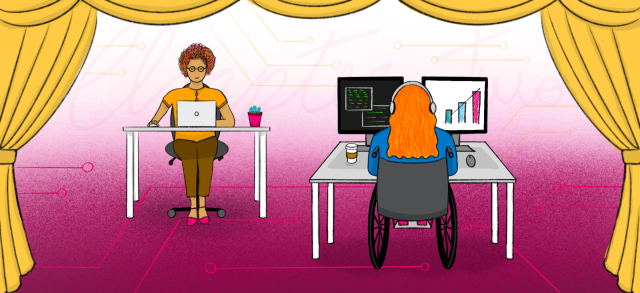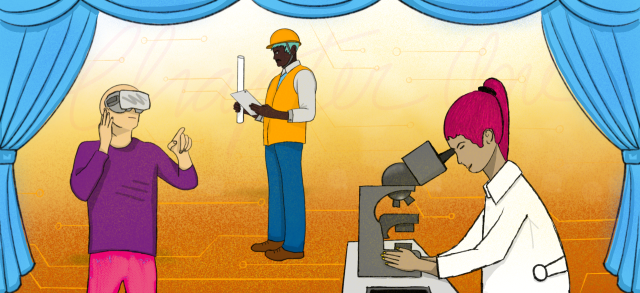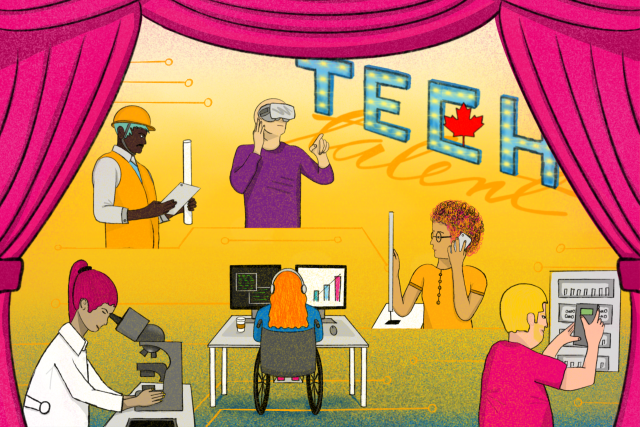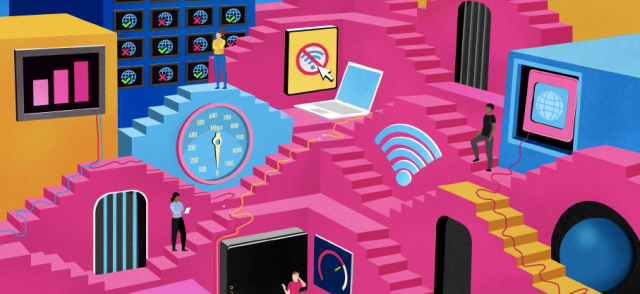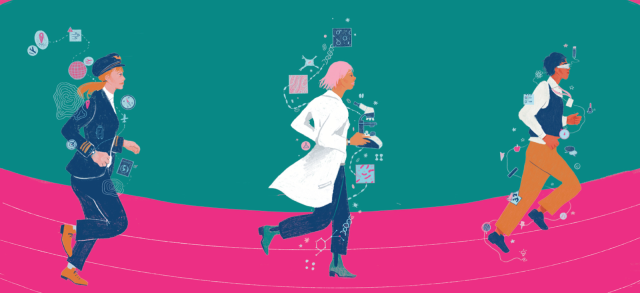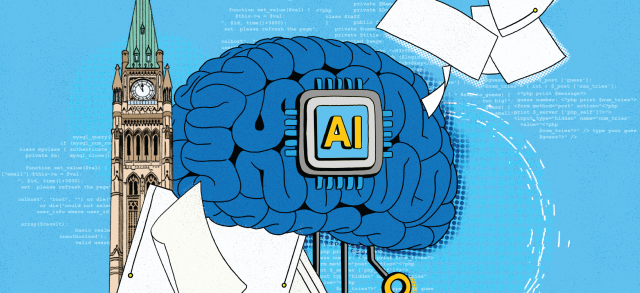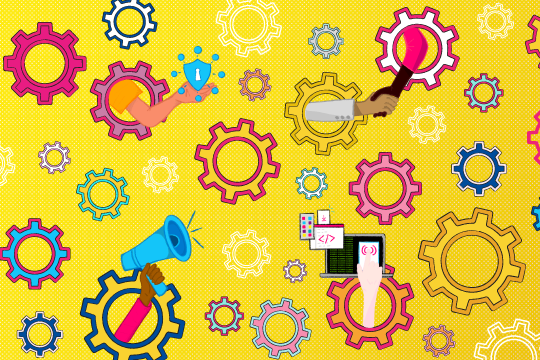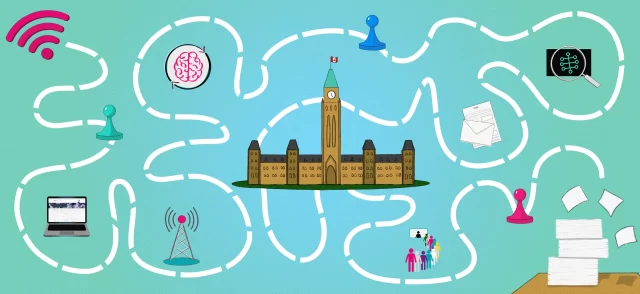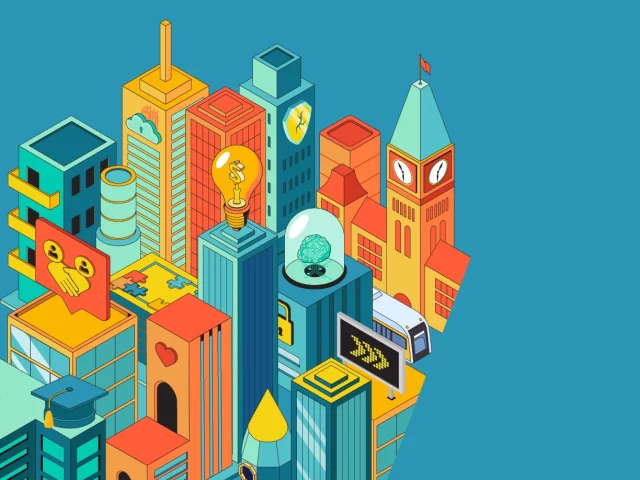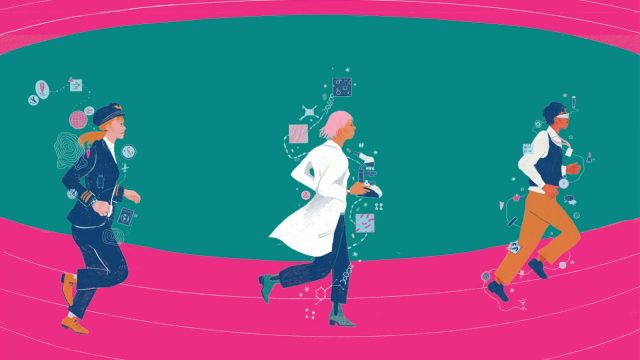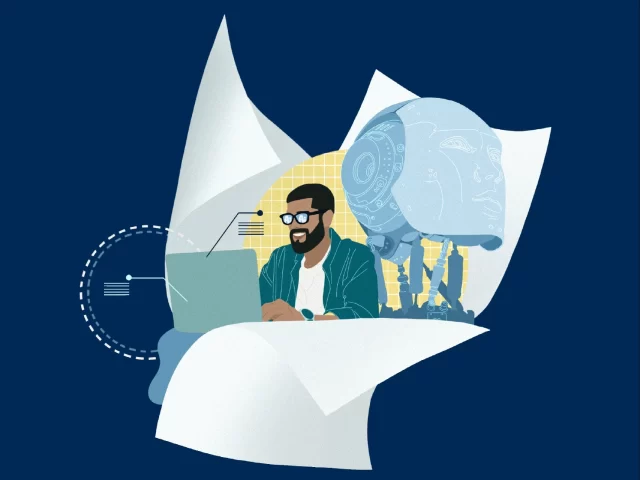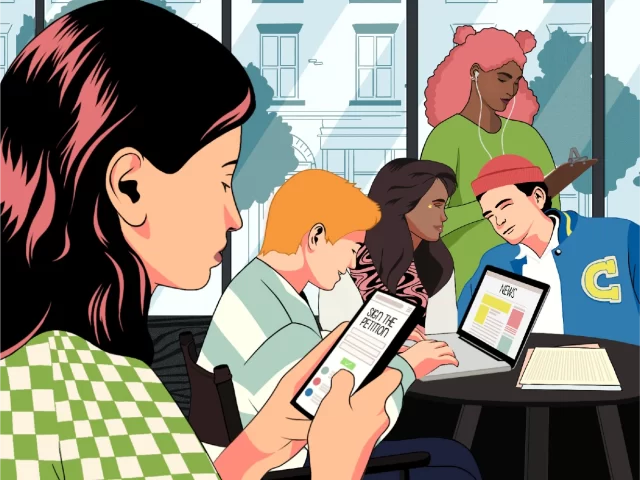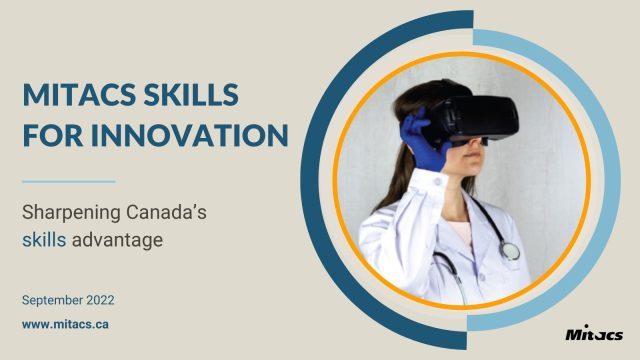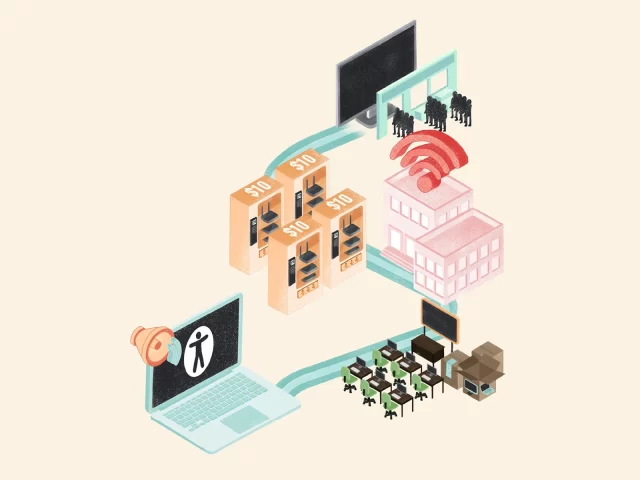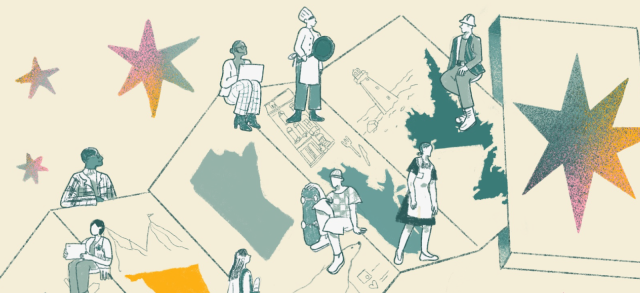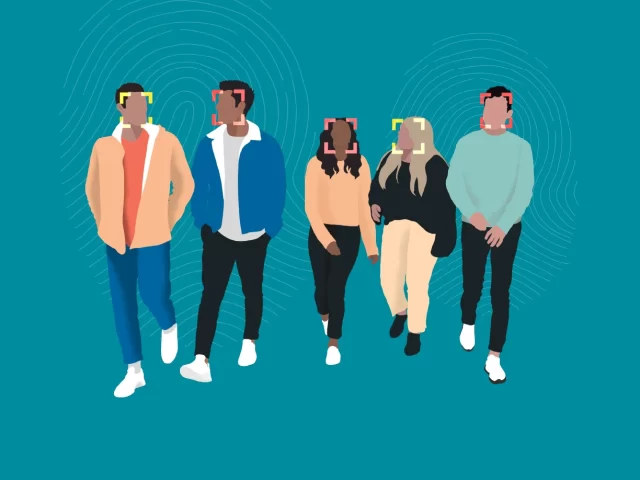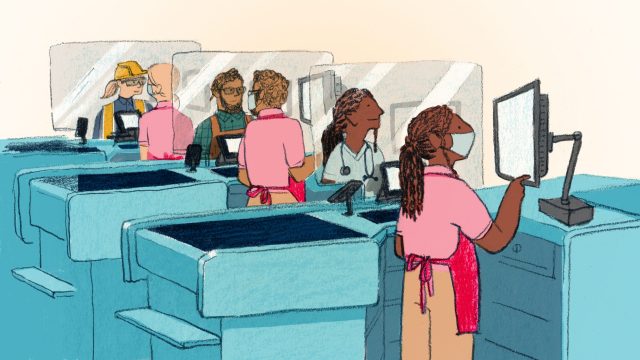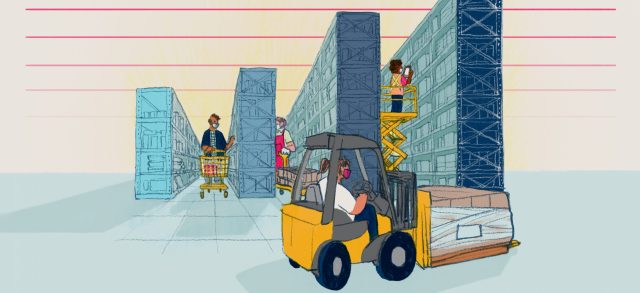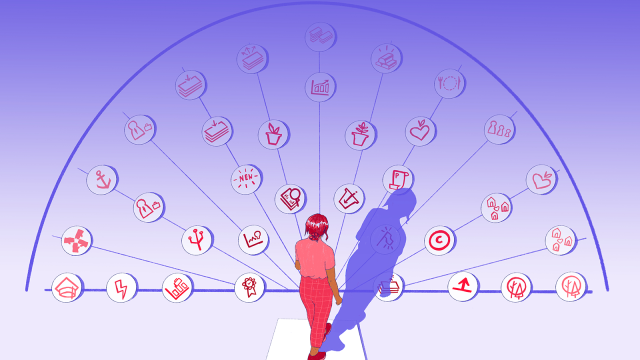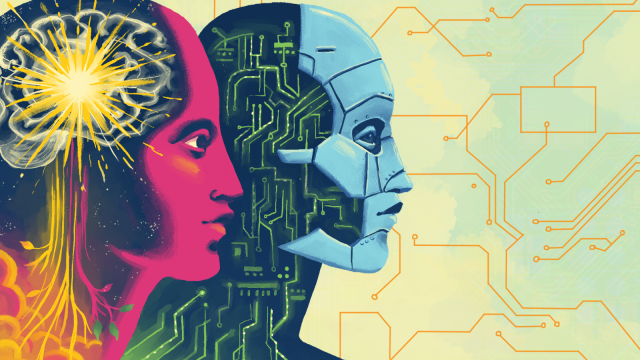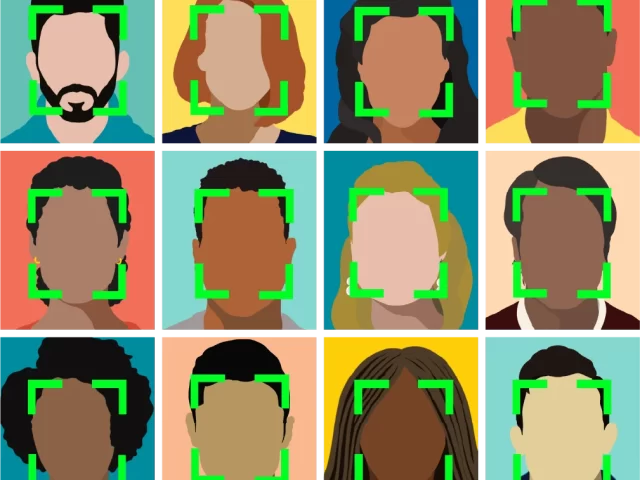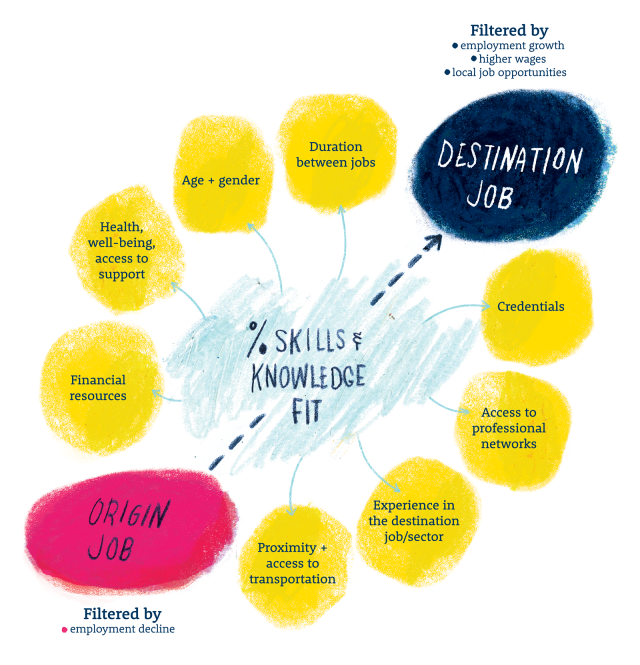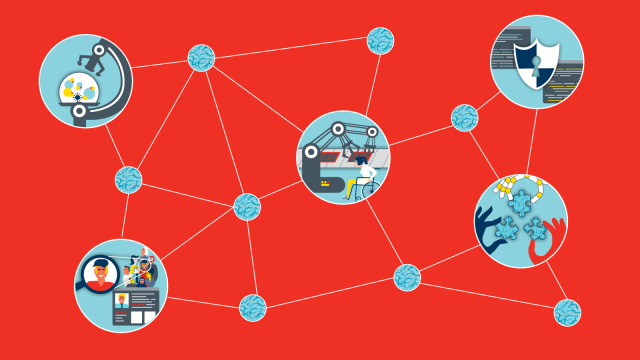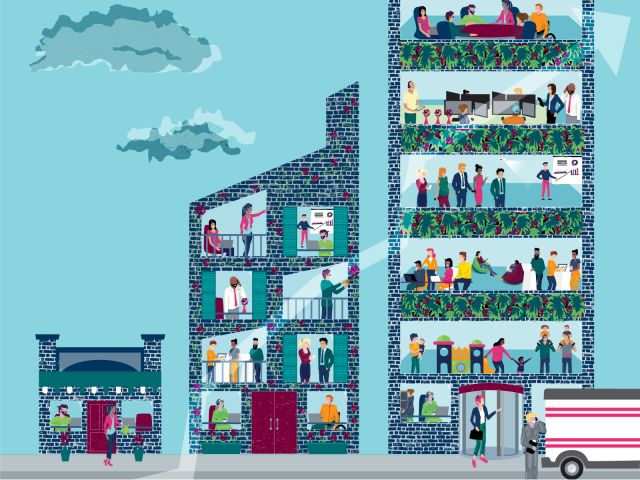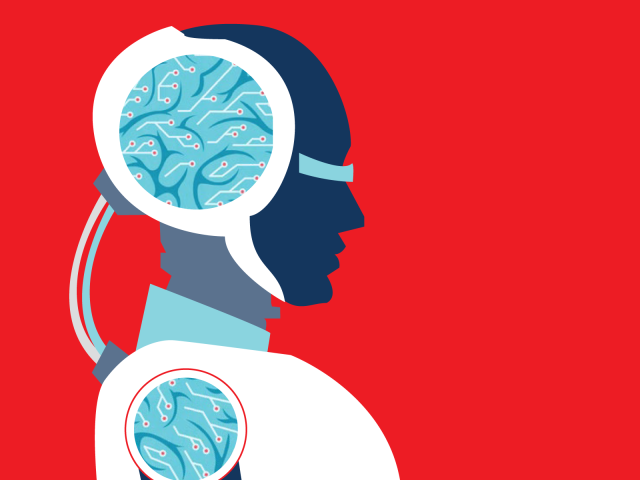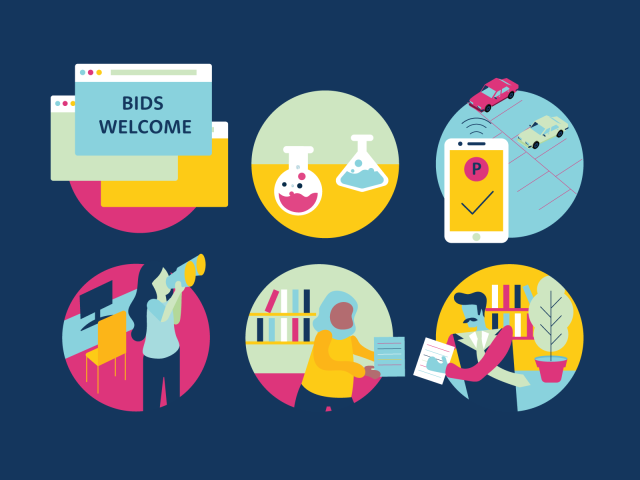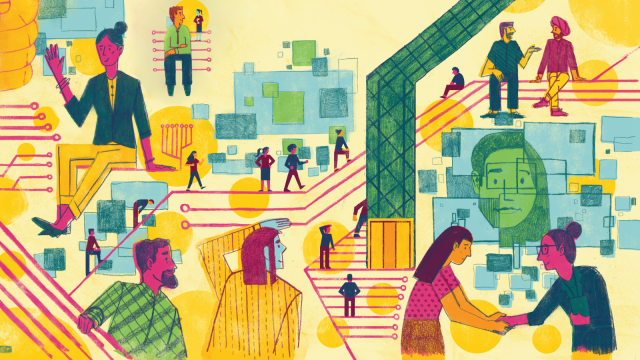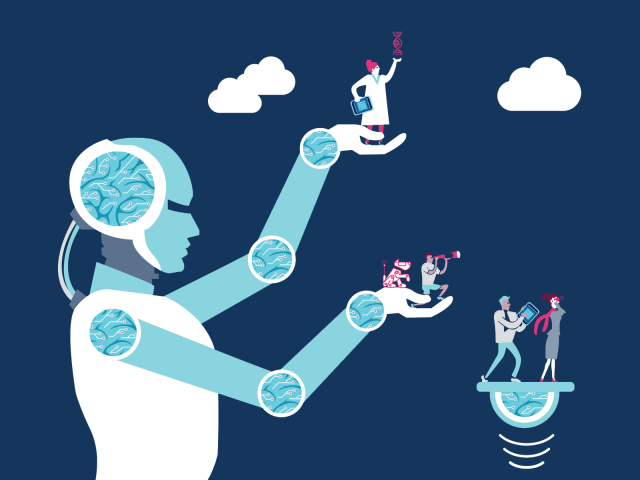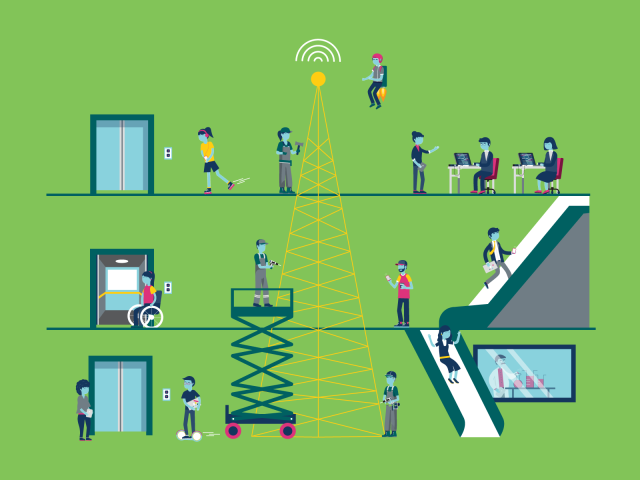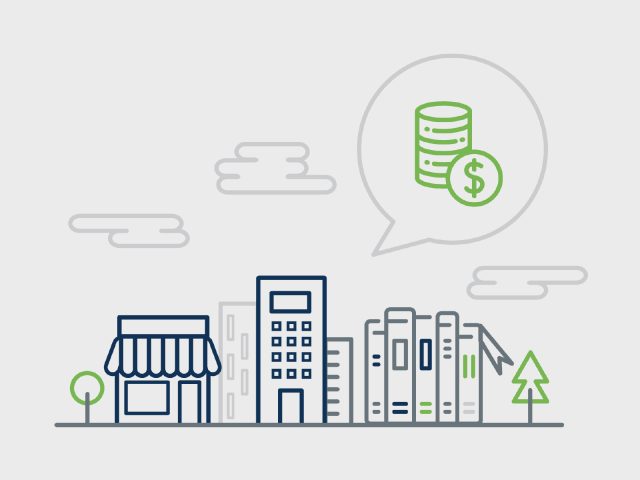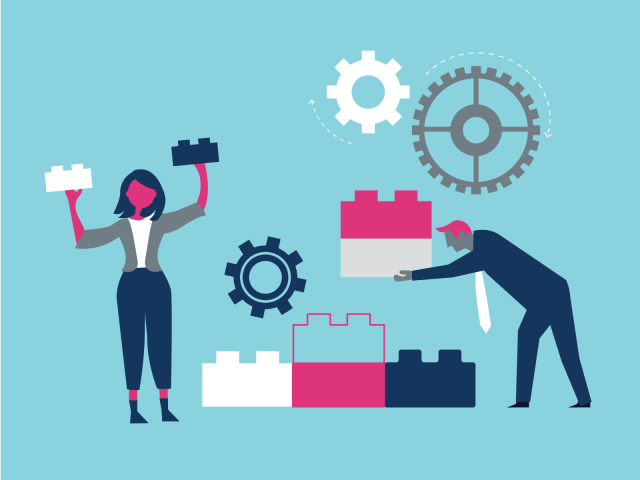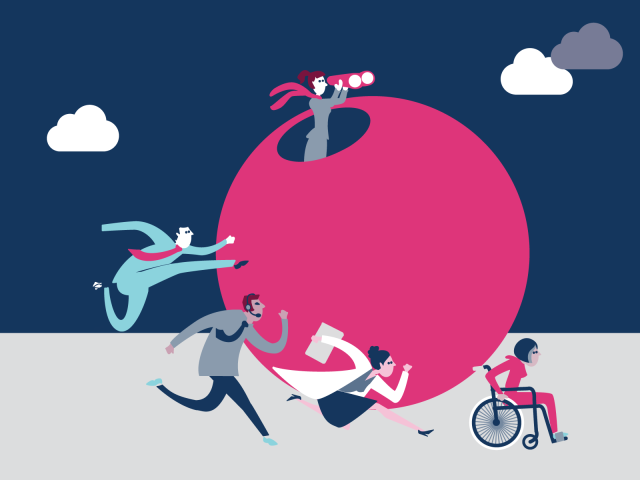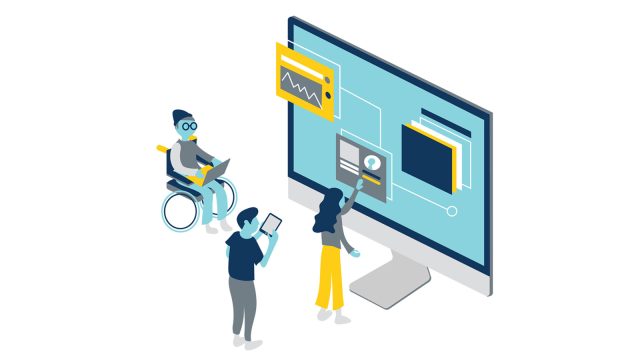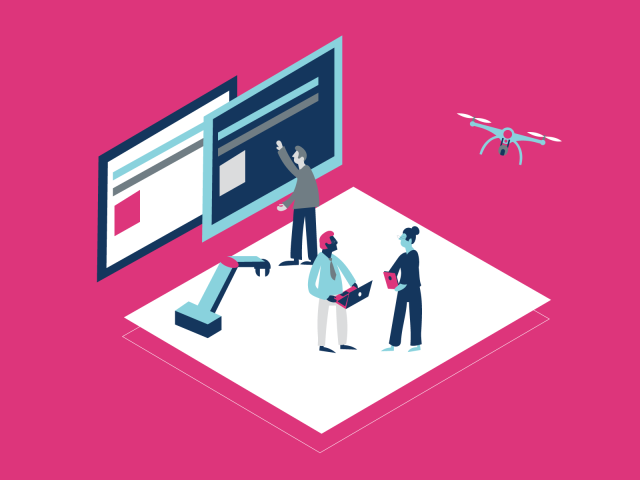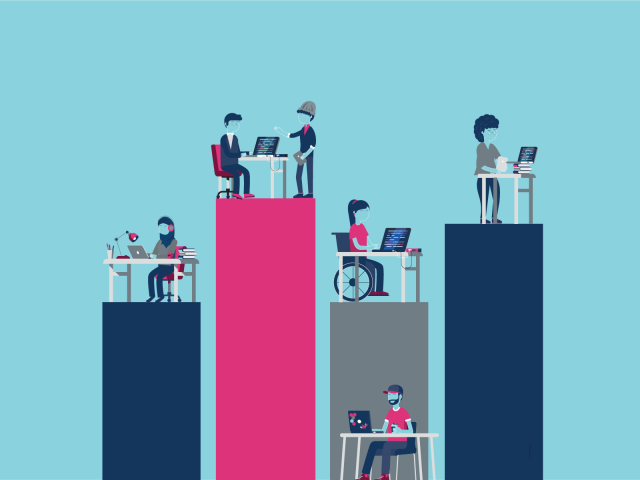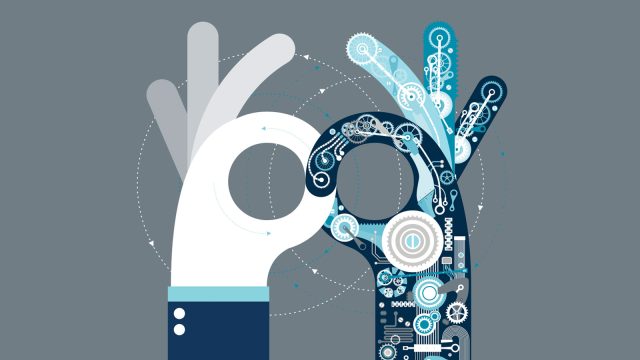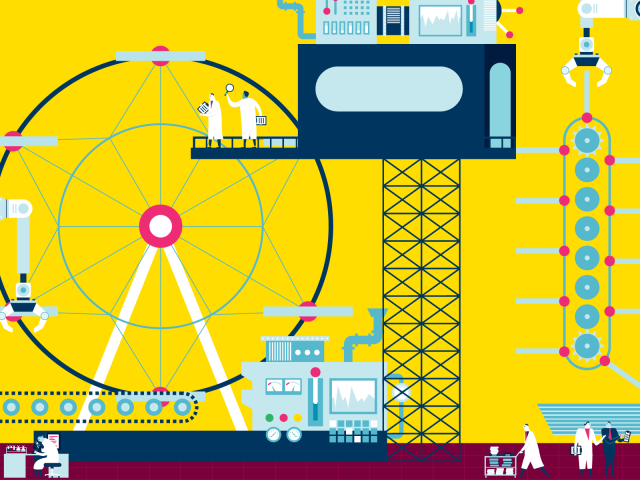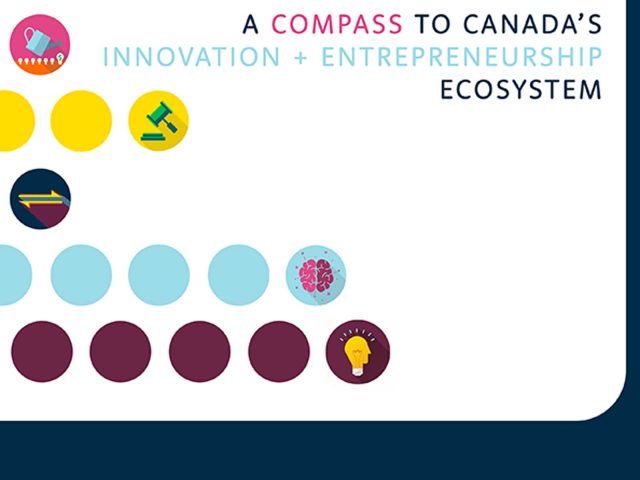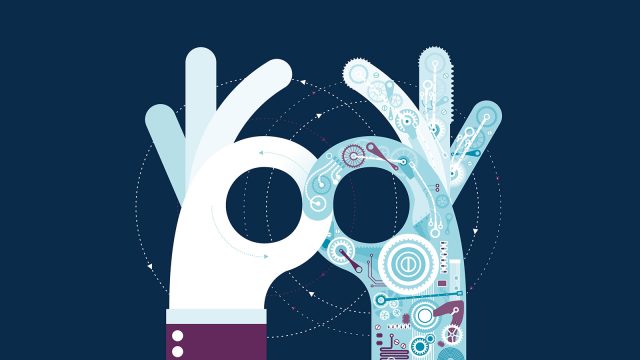Policy & Research

A policy response brief to Bill 194: Strengthening Cyber Security and Building Trust in the Public Sector Act, 2024, tabled by the Government of Ontario’s Minister of Public and Business Service Delivery on May 13th, 2024. The Bill seeks to …
In the second part of our Canada’s Got Tech Talent series, we break down the demographic composition of tech workers in Canada to understand who is benefitting from these jobs, and which groups within the tech workers category are most …
This first chapter serves as a beginning of our comprehensive analysis of the talent that makes up the technology workforce in Canada.
Canada’s Got Tech Talent report series provides a comprehensive overview of the size of the tech workforce in Canada, where tech work is growing and shrinking geographically, the demographics of who Canadian tech workers are, and their pay and participation …
In March and April 2024, the Dais organized a two-part workshop with over 40 participants from academia, civil society, government, and industry. These workshops aimed to bring experts together to discuss the threat from foreign disinformation today. The workshop also …
The white paper discusses the rising threat of online disinformation targeting Canadian companies, affecting brand trust, share prices, and economic stability. It highlights the role of generative AI in amplifying false narratives and provides practical solutions for corporate leaders to …
In recent years, the City of Toronto has been making advancements to overcome significant disparities in internet access within the City. However, some significant gaps remain and need to be addressed in order to fully close the digital divide.
This brief presents the findings of a national representative survey conducted by the Dais at Toronto Metropolitan University from April 11-22, 2024, before Ontario announced its new restrictions, to gauge Canadian attitudes with respect to cell phone bans in classrooms.
This brief is the Dais’ response to a consultation call initiated by Finance Canada to review the country’s signature innovation support program: the Scientific Research & Experimental Development tax credit (SR&ED).
This report lays out different policy scenarios for Canada to close the AI Compute gap, retain AI firms and talent, and promote greater AI development and adoption.
From September to November 2023, the Dais, supported by the Canadian Race Relations Foundation, hosted a five-part discussion series with over 300 live participants and over 1,000 replay viewers. The series explored public policy issues related to education, climate change, …
Ontario’s Blue-Ribbon Panel on Postsecondary Financial Sustainability provided thoughtful, utilitarian advice to the government for shoring up university and college finances in the near-term. But with postsecondary education in the midst of profound and longer-term changes, did this moment actually …
This report investigates outcomes tracking in Canadian higher education and related notions of quality and value assessment, with the aim of informing better post-secondary policy, education and labour market planning, and learner career pathway navigation.
As Canadian representatives gather with counterparts from around the world at the 2023 United Nations Climate Change Conference (COP28), it is a significant moment to take stock of the attitudes of younger Canadians about their personal actions to address climate …
This submission to the Standing Committee on Human Resources, Skills and Social Development and the Status of Persons with Disabilities summarizes the known impacts of automation and the path that Canada should take to support workers amidst the latest wave …
This submission to the Standing Committee on Industry and Technology (INDU) highlights areas of concern and recommendations to make Canada’s proposed Artificial Intelligence and Data Act (AIDA) fit to purpose to responsibly govern AI and its risks. In October 2023, …
As digital skills continue to evolve at a rapid pace, workforce planners, policymakers and employers must ensure the workforce is equipped to meet current and future labour market demands.
Microcredentials for digital skills can provide alternative pathways for professionals without formal training or education in data science, computer science, or software engineering but show competency in these skill sets.
The significant compensation disparity between Canadian and American tech workers calls for renewed efforts to scale Canadian tech companies.
This report assesses the level of digital transformation of Canadian government services through the lenses of digital culture, skills, and access.
As advances in AI re-shape Canada’s economy and workforce, businesses nation-wide must accelerate responsible AI adoption to remain globally competitive.
This research examined the experiences and attitudes towards remote work in Canada for employees and supervisors and sought to understand how the arrangement has affected productivity, satisfaction, trust and well-being.
College-to-university transfer is an important postsecondary pathway that, with sufficient guidance and support, can increase accessibility for groups traditionally underrepresented in university.
At the intersection of climate and digital policy, there is a new and virtually untapped area of opportunity to accelerate Canada’s path to net-zero through the use of digital tech and infrastructure.
Investing in young Indigenous tech workers’ prosperity calls for a multi-faceted policy approach that improves physical access, provides demand-driven training, and indigenizes training initiatives.
CASE is a diverse group of organizations, community groups, parents, students, educators and individuals who share the common goal of effectively ending the practice of academic streaming in Ontario schools. The Coalition worked to conduct research, advance advocacy and raise …
Financial regulators have taken important steps to mitigate crypto risks to consumers and the economy, but more action must be taken to address the sociotechnical threats, such as scams and fraud, experienced by over 35% of Canadian crypto-asset owners.
Social media platforms have, in many ways, become a new public square, where people in Canada and around the world connect and engage in society and our democracy. Increasingly, though, the platforms and their algorithms have also been weaponized by …
Informed by a literature review, jurisdictional scan, interviews and a round-table discussion, this report analyzes the obstacles to commercialization experienced by Canada’s cybersecurity startups and the opportunities for overcoming these obstacles.
We developed two updated versions of our original crosswalk, which underpin our latest findings in the Digitalization in Canada project.
How digitalization has changed work over a 15-year study period and how these changes have affected the tech labour force in terms of worker inclusion, productivity, and pay.
This report offers a comprehensive look into how technology has impacted jobs and workers across 500 occupations in Canada in the last 15 years.
This report shares several key concerns, with corresponding recommendations to improve Canada’s proposed AI framework, particularly under the Artificial Intelligence and Data Act (AIDA) of the newly tabled Bill C-27: Digital Charter Implementation Act, 2022.
This report explores the impacts and implications of youth civic engagement and leadership development and its potential to foster social cohesion, improve mental health and decrease loneliness.
This report explores what the futures of public and non-profit leadership could look like in 2030 using strategic foresight.
In partnership with the Brookfield Institute and Shift Insights, this report by Mitacs seeks to increases our understanding on the critical skills Canada needs to become a global leader in innovation.
This report contributes to the Government of Canada’s 2022 consultation on the National Cyber Security Strategy regarding both the renewal of the Strategy and emerging issues on the medium- and long-term horizon.
This report examines the unique challenges and needs of Canada’s municipalities for securing their critical infrastructure from cyber threats, developed through a literature and jurisdictional review, along with interviews and a round table with experts.
This report was prepared at the request of the Parliamentary Protective Service to examine the human rights and legal considerations for the hypothetical use of face recognition technology in the context of ensuring physical security within Canada’s parliamentary precinct and …
Drawing from interviews with 14 experts, this report provides insight into the unique challenges and barriers to technology adoption in the construction industry, what industry actors are doing to address it, and what governments and firms can do to improve …
This report outlines considerations to inform the City of Toronto’s approach to digital equity and provides evidence-informed analysis of where gaps in access persist, what types of digital barriers continue to impact equity-deserving groups and the initiatives that have and …
This report provides detailed action-oriented insights into the challenges and opportunities in the Canadian innovation landscape, along with comprehensive policy recommendations to help deploy successful moonshots in Canada.
This report summarizes a six-part workshop series that found the digital divide in Canada is not just an urban-rural infrastructure problem: rather, digital exclusion is driven by a series of divides correlated with socio-economic and demographic factors.
In collaboration with five partners, the project took an innovation-based approach to identify new and novel solutions to pressing labour market challenges in identified regions across Canada.
This report shows that while small in number, taken together, scale-ups are crucial in ensuring Canada’s long term economic sustainability. In order to unlock their full potential, policymakers need to carefully approach discussing scale-ups, particularly in distinguishing the different ways …
This report document outlines the current state of the law in Canada regarding police use of facial recognition and encourages best practices around privacy impact assessments, accuracy, data minimization, purpose limitation, data security, retention, openness and transparency, individual access, and …
This report responds to the Government of Canada’s proposed approach to regulating online harms in 2021 in a manner that protects and advances Canadians’ fundamental rights and freedoms, and furthers efforts at international platform governance alongside allied jurisdictions.
This report provides a better understanding of the current state of knowledge regarding workplace surveillance, including remote work surveillance, in Canada.
This policy brief builds on the excellent research on encryption produced by experts in Canada and extends this knowledge by presenting an alternative policy framework to help guide Canada’s policy on encryption.
This report begins to identify both policy gaps and pragmatic solutions that can harness the skillset of security researchers and professionals who find and responsibly disclose security flaws in government websites, software, hardware, IoT devices, and critical infrastructure before attackers …
Exploring what we know about digital technology’s impact on labour and the economy — and how to best conceptualize and measure its impact in the future.
Increasing digital technology adoption and skills among Canada’s SMEs could have a significant, positive impact on Canada’s wider economy.
This updated Playbook for policymakers, employers and service providers delivers a revised framework and new methods for identifying job transitions pathways for mid-career workers.
As the food retail sector continues to evolve, so does the reality of many grocery jobs. This report identifies specific opportunities for workers looking to transition into other in-demand jobs in Ontario.
Academic streaming describes the process of dividing students into differentiated groups based on their perceived academic ability and/or prior achievement. While streaming happens both formally and informally across grade levels, entrance into secondary school in Ontario marks a more institutional …
Exploring trends driving the evolution of the food retail sector — from the rise of data and e-commerce to changing consumer habits — and their impact on grocery workers and employers in Ontario
This report outlines the realities and policy challenges of mitigating disinformation and other harmful online materials shared through private messaging applications and services in Canada.
The foundations of today’s global economy are rapidly shifting, and a new type of economy is emerging that is dominated by intangible assets like ideas, data, and talent. This report explores the most important barriers that Canadian scale-ups face along …
This toolkit is designed to provide actionable examples of changes funders can make to reduce biases and increase capital access for equity-deserving groups, including but not limited to: Black women, First Nations, Métis, and Inuit women, women of colour, trans …
John Knubley, Canada’s former Deputy Minister of Innovation, Science and Economic Development, reflects on the rationale, challenges and performance of the Superclusters
Using Statistic Canada’s Canadian Survey on Business Conditions (CSBC), we analyzed business trends throughout the pandemic, such as remote work, online sales, and employment and skills demands.
This report explores how gender control of a firm impacts growth and the likelihood that a firm becomes a scale-up. The findings indicate that gender control does not directly impact the probability that a firm will reach scale-up status, but …
Using a wide array of data, we explore Canada’s inclusive innovation performance relative to international peers. COVID-19 and the ensuing economic crisis have revealed the need to boost participation in the innovation economy and broaden the distribution of its benefits …
This submission to the Government of Canada recommends reforms to the Privacy Act to mitigate privacy and security risks currently faced by people in Canada with respect to facial recognition technology.
Using futures research and expert workshops, this report explores a broad range of trends with the potential to impact Canada’s labour market over the coming decade—many of which have been accelerated, disrupted, or created by COVID-19. It is designed to …
This report provides a detailed understanding of internet and device access in Toronto amidst the COVID-19 pandemic in 2020 using a multi-method survey.
A surprising consensus is emerging across the political spectrum in Canada on two issues: governments need to engage in activist industrial policy; and economic growth isn’t a sign of success if it exacerbates inequalities, damages the environment, destroys communities and …
Creative businesses and workers are a vital component of Canada’s economy, from freelancers, artist collectives, to internationally competitive firms, spurring innovation and knowledge transfer, commercial and cultural value, and employment opportunities. This project explores the role of creative entrepreneurship in …
This discussion paper analyzes considerations and provides policy options on the issue of data sovereignty, focusing specifically on Canadians’ personal data that are collected and stored by social media platforms.
This report summarizes a roundtable regarding how facial recognition software is being used by the public sector, including its potential benefits and risks; views on the push for a limited prohibition on its use; and options to mitigate risk before …
An in-depth survey of the experiences of high-growth women founders as they scale their companies, revealing divergent pathways to growth and new strategies for government, policymakers, accelerators and funders to better support the distinct needs of women-led firms.
This interactive documentary case study pushes the boundaries of digital learning and tells the story of how the Ontario government transformed student financial aid.
Sharing lessons from our pilot program, which tested a model for delivering accessible digital literacy and coding programs in libraries and community spaces across Ontario. This report captures the thinking behind the pilot and makes a case for supporting after-school …
This report covers the results of a representative survey of 2,000 Canadians conducted in mid-May 2020. The survey sought to understand Canadians’ experiences, choices and priorities toward their cybersecurity and digital privacy.
In this report, we explain what contact tracing is, its context, share our most up-to-date understanding of the issue, and reveal Canadians’ attitudes toward the use of the technology.
Our new employment and skills forecast—the culmination of our Employment in 2030 project—provides a new tool for understanding how Canada’s employment and skills landscape could change between now and 2030. The accompanying report, Ahead by a Decade, explores what this …
In partnership, the Brookfield Institute and the Innovation Policy Lab introduce, articulate the need for, and conceptualize a new way to monitor innovation and inclusion (or inclusive innovation) in Canada—and shed light on how the country is performing
The drivers of value creation in our economy are shifting from tangible to intangible assets, such as data, intellectual property, and brands. Canada needs to adjust to this shift to develop a globally competitive economy. This report provides an introduction …
This report uses online job postings data from Burning Glass to push our understanding of which digital skills are in demand and what combination of digital and soft skills can help workers successfully navigate the Canadian job market.
This report assesses the effectiveness and compliance of Facebook with Canada’s new political advertising law in the 2019 election.
This report and accompanying playbook present a new model to help displaced workers transition to jobs where employers are experiencing talent gaps. Using labour market information, they focus on the underlying skills required in a job while also considering the …
This report outlines the insights we gathered at six expert workshops held across Canada as part of our Employment in 2030 initiative. It shares the key trends that participants see as most likely to create change for Canada’s labour market, …
To better understand the skills, knowledge, and abilities that make up the 500 national occupations in Canada, we created a crosswalk to apply US data in a Canadian context
We partnered with CIFAR to design and deliver a series of labs to discuss the public policy implications of artificial intelligence (AI). This series engaged over 125 policymakers from the public, private, academic, and not-for-profit sectors across Canada. This report …
This report benchmarks and maps scale-up activity in Ontario, supplying vital insights into the best performing companies Ontario has to offer.
Through an examination of available literature, this report identifies talent as a core trend across all barriers and pre-conditions for successful AI adoption.
This report provides a summary of the content covered and insights generated during the AI Futures Policy Lab hosted in Montreal, Quebec in partnership with CIFAR. This is the final lab in a series of five cross-country workshops aimed at …
A look at the complex trends impacting the future of employment in Canada–and how these trends interact in not-so-obvious ways. While not a prediction tool or a deep analysis of any one trend, this report is designed to spark exploratory …
Developed in partnership with MaRS Solutions Lab and the City of Guelph, this report seeks to better understand innovation procurement and identify opportunities for greater experimentation. As municipal governments look to purchase innovations as well as purchase innovatively, what are …
Looking at the many faces behind Canada’s tech occupations, with a focus on who are Canada’s tech workers? Where do they work? And what do they earn?
This report provides a summary of the content covered and insights generated during the AI Futures Policy Lab hosted in Ottawa, Ontario in partnership with CIFAR. This is the fourth lab in a series of five cross-country series of workshops …
This report provides a summary of the activities and content covered during the AI Futures Policy Lab hosted in Vancouver, British Columbia in partnership with CIFAR. This lab is part of a cross-country series of workshops with emerging policymakers exploring …
This report provides insight into the activities and policy recommendations generated during the second in a series of AI Futures Policy Labs we’re hosting across Canada in partnership with CIFAR.
An overview of activities and insights from participants during the first AI Futures Policy Lab we hosted in partnership with the Canadian Institute for Advanced Research (CIFAR).
Informed by interviews with leaders in Waterloo’s tech community, this report provides a set of key takeaways for employers and aspiring tech workers alike, on the process of finding and retaining top tech talent.
By highlighting case-studies from Finland and North Carolina, this report demonstrates new ways that policymakers, employers and stakeholders are pursuing innovation-driven economic goals, while ensuring workers are not left behind in the process.
This report maps the digital literacy education and training landscape in Canada. It highlights the types of digital skills that people in Canada are pursuing, sheds light on barriers to access, and identifies existing gaps and potential opportunities to improve …
This report looks at how technology can bring citizens closer to the policymaking process. It was developed in response to Budget Talks, a program launched by the Ontario government in February 2015 to inform the pre-budget consultation process. This program …
This research report provides a sketch of the policy innovation landscape in Canada, with specific reference to the tools, techniques, and approaches occurring at all three levels of government. Through this analysis, we have identified the challenges and opportunities that …
This report shares insights from a policy innovation engagement with BII+E and the Anti-Racism Directorate, which aimed to create a foundational narrative for a public awareness campaign on systemic racism; engage community partners and build relationships; and ensure participants left …
This report explores the risks and rewards automation and outlines the dual challenge technology advances present to Ontario’s economy—to simultaneously improve lagging technological adoption, while mitigating its negative impacts for some workers—and proposes a bold strategy to meet this challenge …
This report gathers insights from guest speakers and participants gathered during our one-day conference, hosted in partnership with the Government of Ontario’s Policy Innovation Hub. The event explored changes in technical capabilities of AI, their commercial applications, and proposed recommendations …
This report provides of an overview of insights and perspectives from a Toronto regional consultation on the development of an Ontario Scale-Up Strategy. Hosted on behalf of the Ministry of Economic Development & Growth, the event was attended by thirty-one …
This report was produced in collaboration with one of Canada’s leading thinkers on innovation policy, Professor David Wolfe (Innovation Policy Lab Co-Lead, Munk School of Global Affairs, U of T). Creating Digital Opportunity’s mission is to identify strengths in current …
This report responds to a growing recognition worldwide about the importance of digital literacy for students, workers, and citizens in an increasingly digital economy. It focuses on digital literacy as it pertains to the changing nature of work, drawing upon …
Prepared as background reading for participants at our March 2018 AI + Public Policy conference, this report explores the origins of AI, AI’s present-day capabilities, the challenges and opportunities associated with these technological advances, and their application to public life …
In a knowledge economy, a talented workforce is the difference between success and failure for a company. This report captures insights from a series of roundtables held with fast-growing tech companies to better understand their talent needs and the barriers …
Produced in partnership with BII+E, the Centre for Innovation Studies (THECIS) and Ryerson University, this report goes beyond conventional measures of entrepreneurial success to focus on entrepreneurs themselves. It presents data that quantifies Ontario’s flourishing entrepreneurial ecosystem and compares Ontario …
This report summarizes key insights from our workshop on women in entrepreneurship, which we hosted to inform the design of a call for proposals. The event sought to better understand the experiences and challenges of women entrepreneurs, and the supports …
Produced with Stack Overflow, the world’s largest software developer community, this report highlights a growing and increasingly important segment of Canada’s tech economy: software developers. It offers a detailed look at the lives of Canada’s developers, how they learned their …
This white paper distills key insights gathered at an event we co-hosted with the Ontario Public Service Renewal team to obtain insights on their strategic framework for public service renewal. The purpose of this workshop was to hear from organizations …
This is the first discussion paper in our a research series aiming to help policymakers and other stakeholders understand the growing need for digital literacy in Canada’s workforce. It sets out our initial thinking on the need for digital knowledge …
This report looks at what rapidly advancing technology means for Canadian regional economies, especially those identified as most susceptible to automation, such as Woodstock, Ont., and Quesnel, B.C. It aims to inform the design of policies and programs that seek …
This case-study looks at the Guelph Civic Accelerator pilot, a project that is breathing new life into traditional public procurement. It is one example of what can happen when a city government reimagines how they do procurement within the existing regulatory context, in …
In its 2017 budget, the federal government committed $950 million to foster the growth and development of “superclusters”. This discussion paper provides an overview of why clusters are important and what the role of government is in cultivating them. It …
This report looks at both the technical and soft skills Canadian youth need to succeed in a changing labour market. To ensure Canada’s youth are adequately prepared for this new economic reality, new models that focus on both improving youth …
Distilling the feedback we received from Let’s Get Digital, an event co-hosted with the Ontario Digital team, this white paper looks to advance insights and recommendations for Ontario’s Digital Government Action Plan. The event convened digital leaders from across industry, …
This report explores the driving forces behind a rise in Ontario’s entrepreneurship rates, including the attitudes, motives and aspirations of entrepreneurs. It elves into relevant policy recommendations, including mentoring programs, developing a strategic vision and programs for women in entrepreneurship, …
This report provides an in-depth look at Canada’s tech sector, along with an updated and broadened definition of it, taking into account the pervasive impact that technology and related jobs have on the size of our country’s economy and workforce.
This report offers a bird’s eye view of Canada’s innovation + entrepreneurship ecosystem. It helps identify and categorize key actors involved to help obtain a high-level overview. It is a resource to learn about other actors, identify opportunities, discover patterns and connect with …
This report demonstrates that nearly 42 percent of the Canadian labour force is at a high risk of being impacted by automation in the next decade or two. Using a different methodology, we also found that 42 percent of the …



